Report
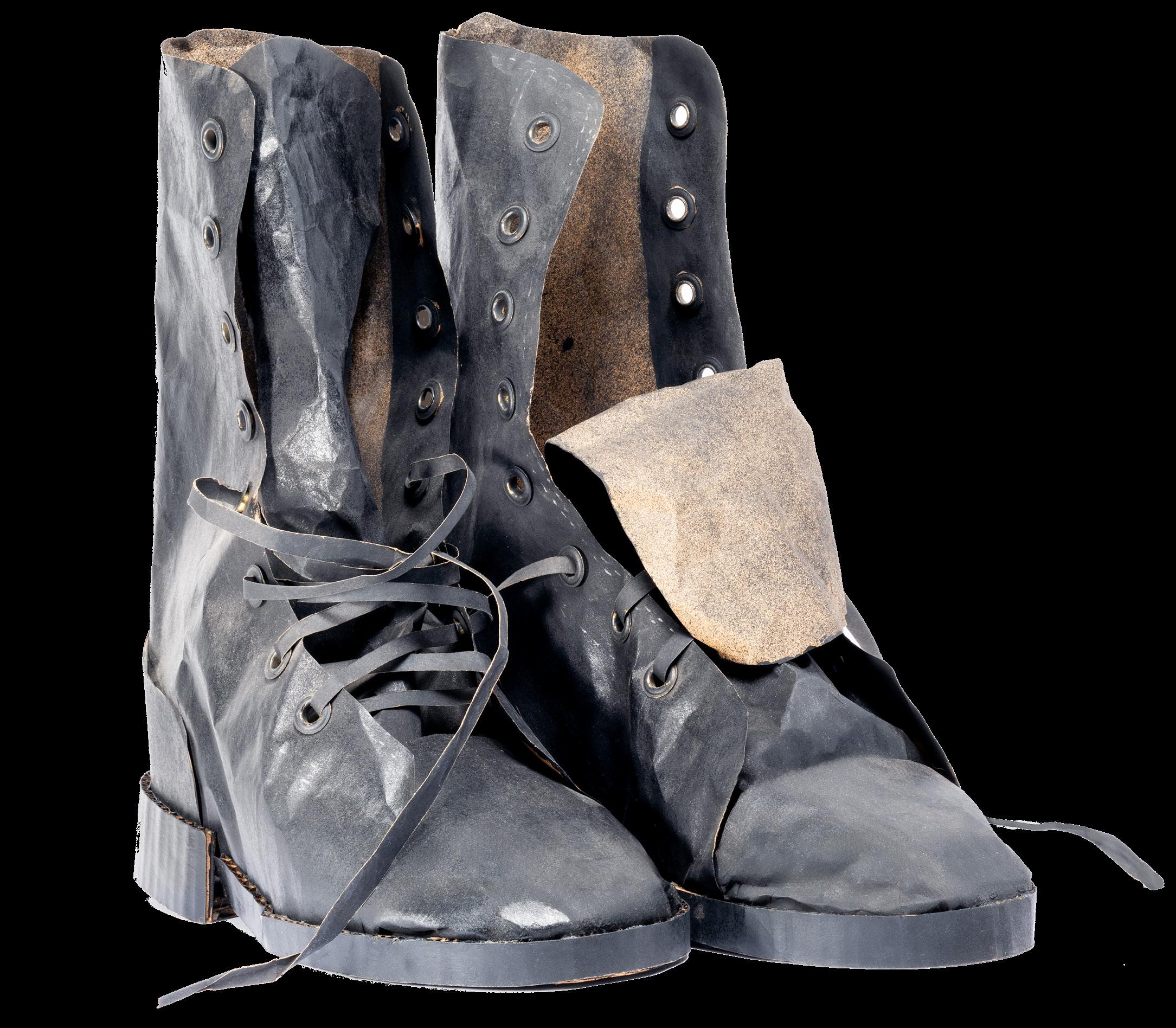
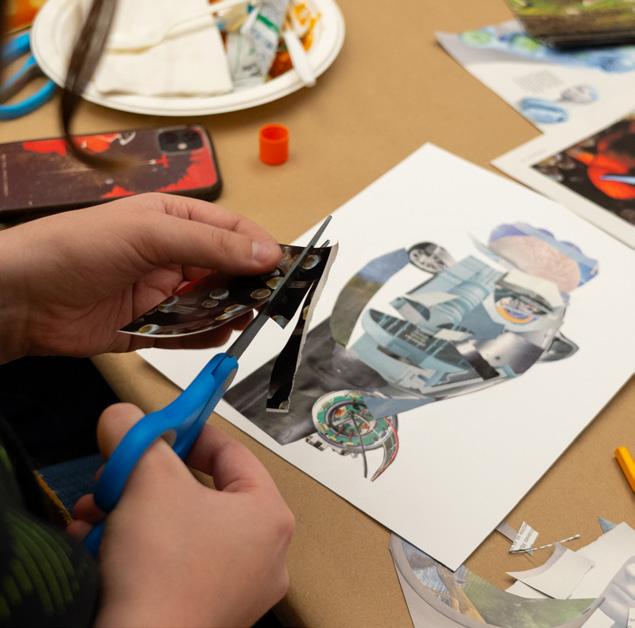
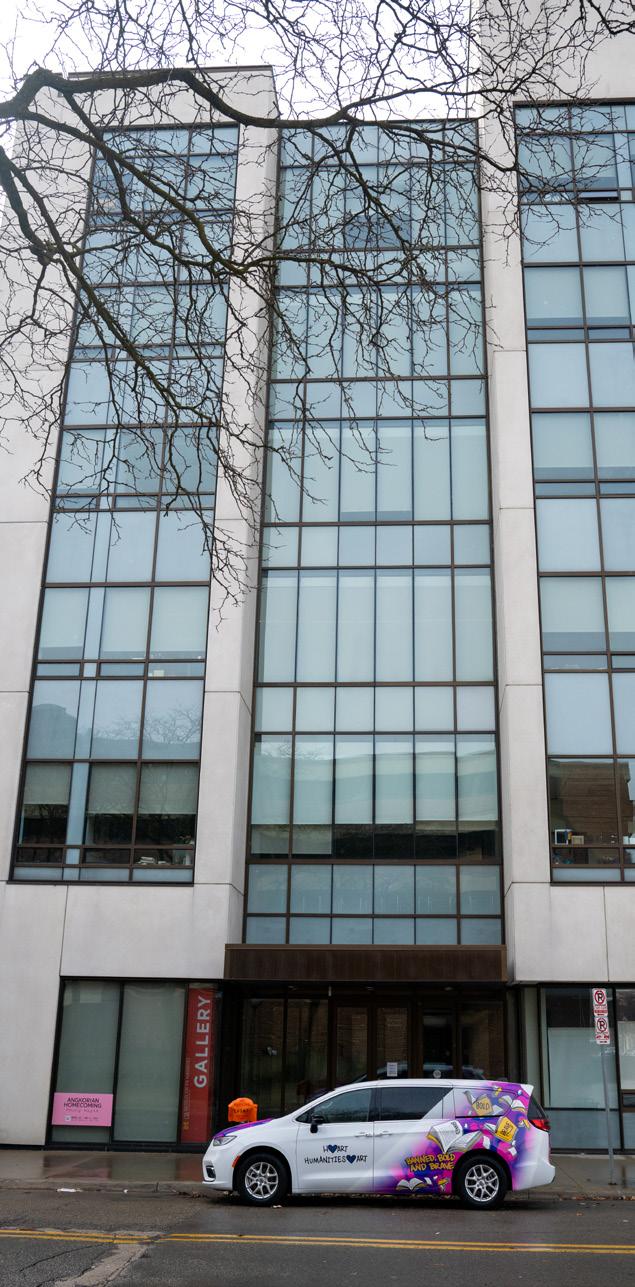
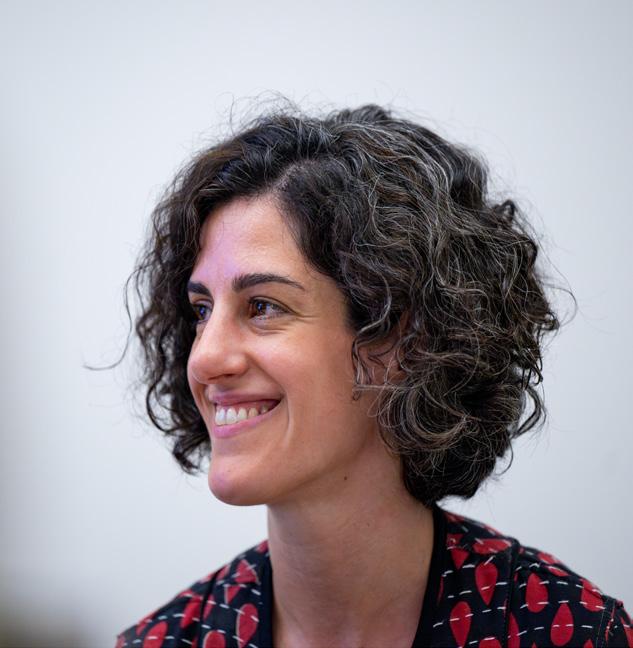
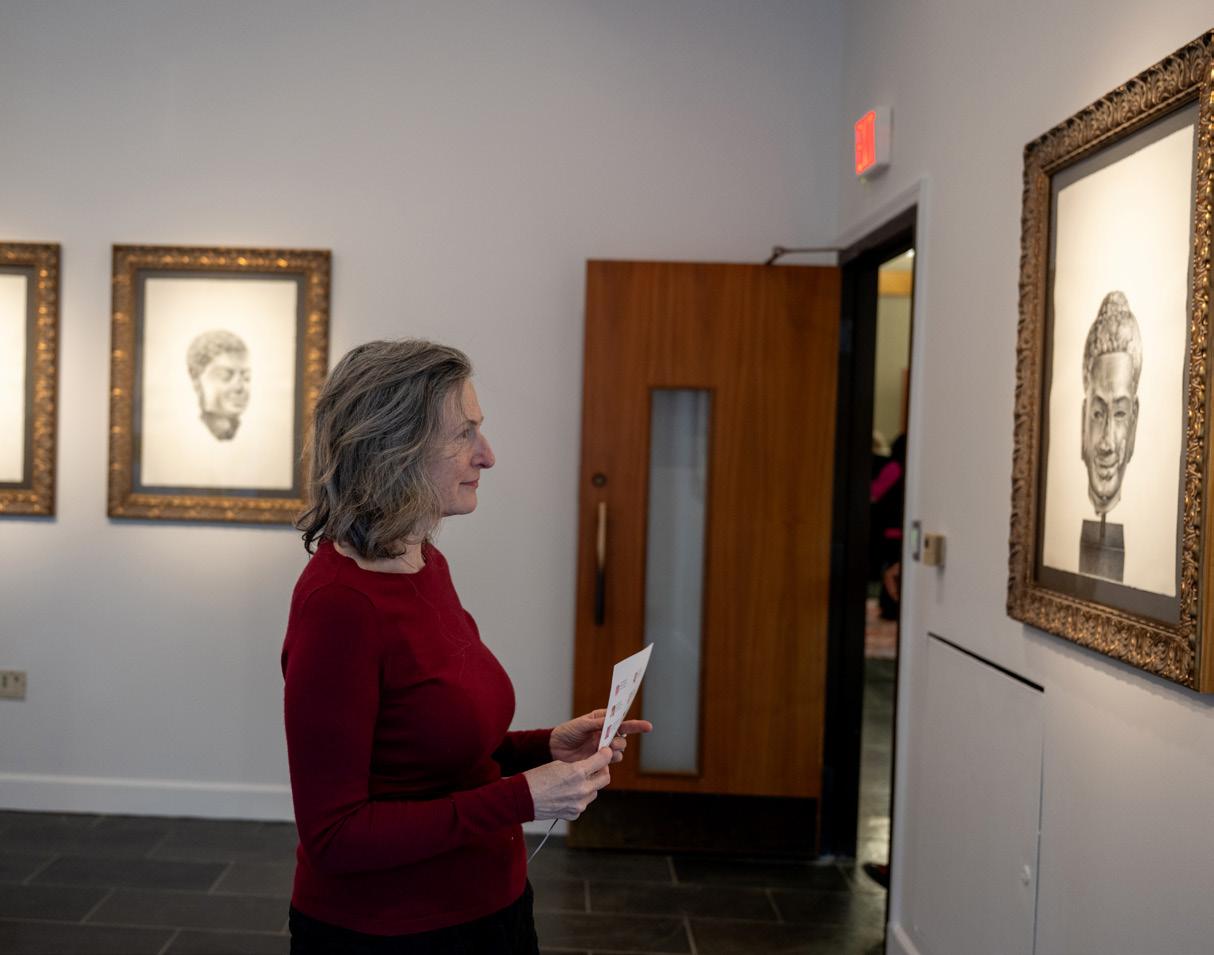
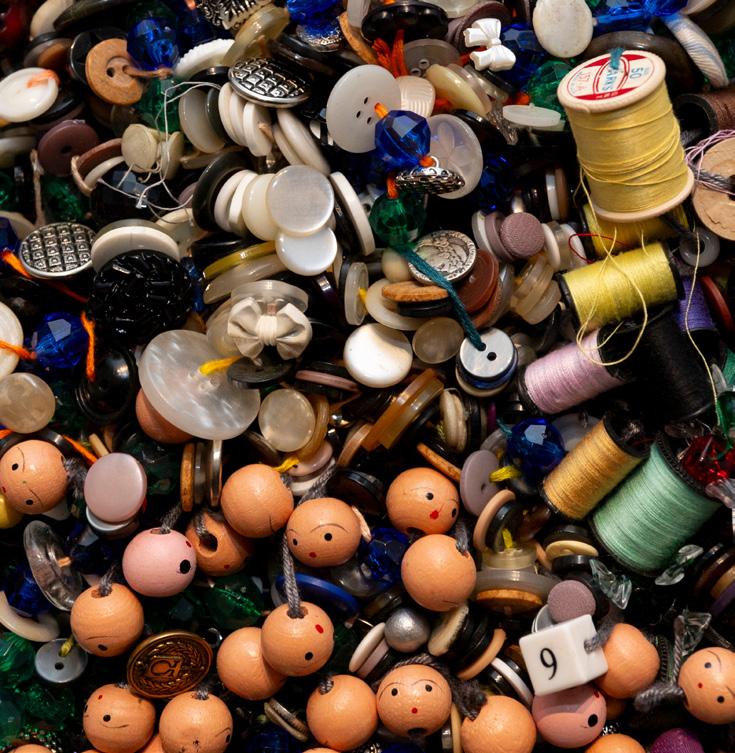
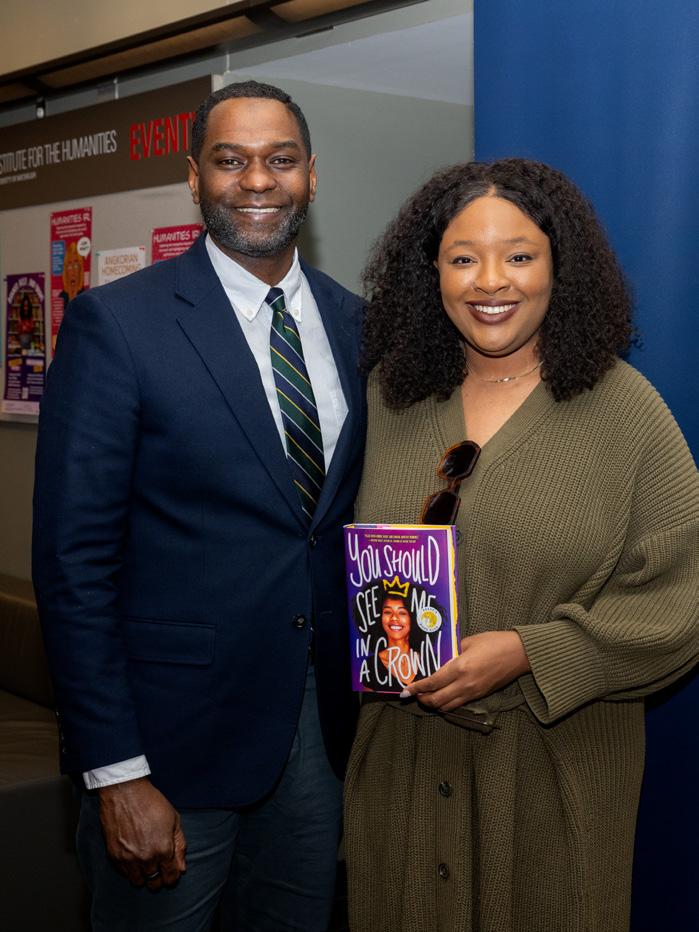
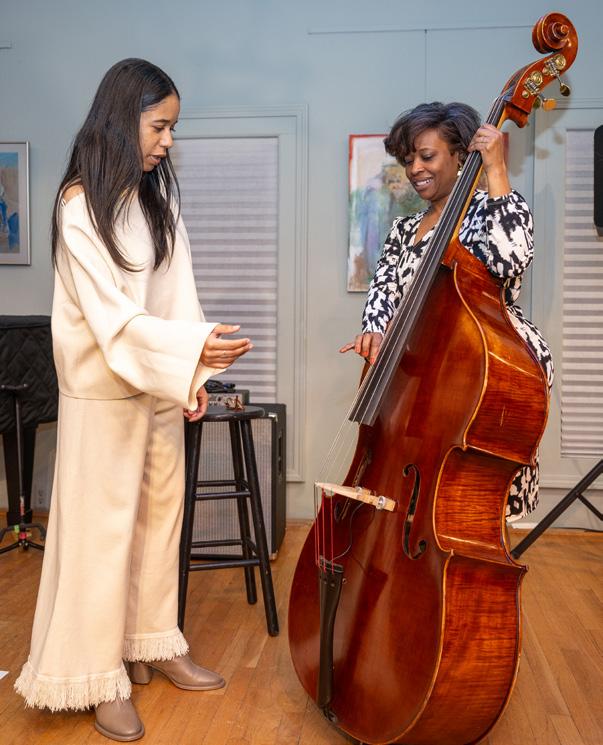
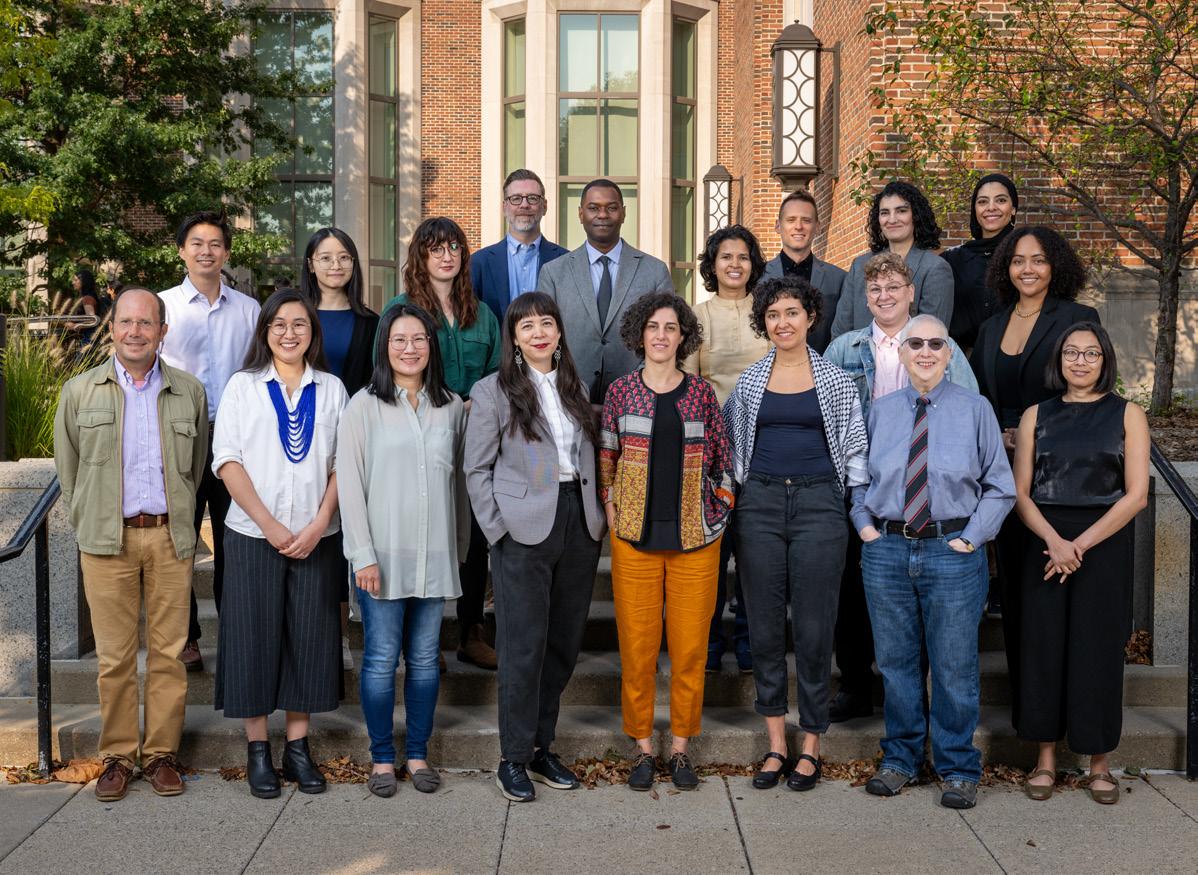
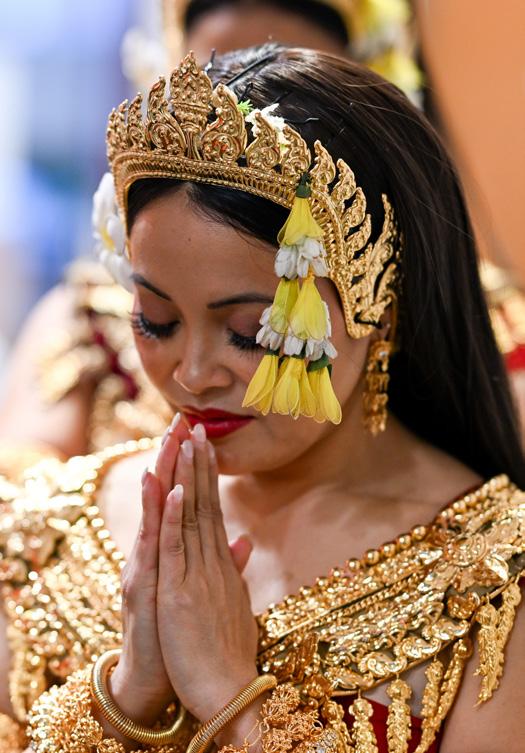
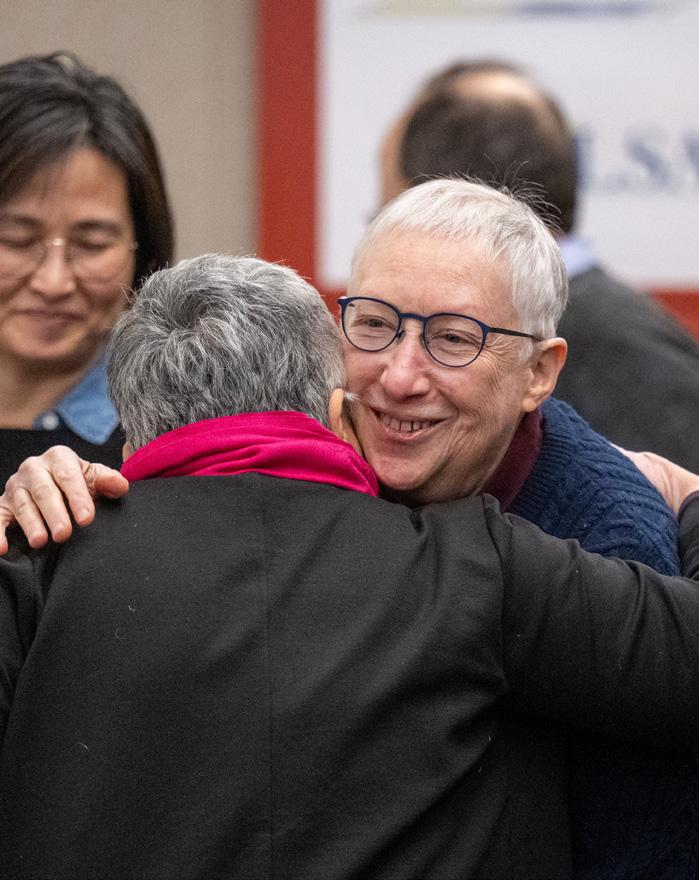

Report












dear friends of the Institute,
I write to you now as I conclude my inaugural year as director of the Institute for the Humanities. I am indebted to my predecessor, Peggy McCracken, who served brilliantly during her tenure as director. In her final letter to our community, published in the 2024 edition of the Annual Report, Peggy noted that she was leaving her post “in a time of intense turmoil.” Writing in the midst of a heated presidential campaign that put on daily display an array of cultural fissures that threatened to rip our national fabric, she predicted that “higher education will certainly be reshaped by current events since cornerstones of our collective project…are under siege.” Despite these dire predictions, few could have imagined just how thoroughly the political and cultural landscape has shifted in the past year. Humanities-related research, teaching, and programming face significant challenges in the current moment. The National Endowment for the Humanities is facing stark cuts to its budget that have had a rippling effect at the state and local level as well as at U-M.
In this environment, I recognize the need for a greater commitment to the humanities. Indeed, the Institute for the Humanities has long been a critically important space for interdisciplinary scholarship, programming, and exhibitions at U-M and in the larger region of Southeast Michigan. This year’s programming has emphasized the crucial importance of the humanities as a resource for addressing the most pressing concerns of our time. In the pages that follow, you will learn about the newly formed Humanities Alumni Network, the H♥ART mobile humanities project and much more. Our gallery has hosted stellar exhibitions touching on critical questions related to disability, immigration, sustainability, and Artificial Intelligence. Through our public programming and engagement initiatives, the Institute for the Humanities is committed to community outreach and engagement as a way of making our work more accessible, more legible, and more
connected to the larger community. Our undergraduate interns have brought the humanities alive in a series of dynamic programs. And, as always, our fellows have filled the halls of the institute with truly astounding and groundbreaking research and presentations.
The institute continues to emphasize the crucial importance of creative, critical engagement, driven by a spirit of open inquiry and freedom of expression.
In this way, the institute continues to emphasize the crucial importance of creative, critical engagement, driven by a spirit of open inquiry and freedom of expression. But we do not do this work alone. The staff, students, and fellows that comprise the institute have worked together in a spirit of collaboration that is further amplified by the meaningful connections that we have with other units across the campus.
I look forward to extending the institute’s mission to enhance collaborations between the humanities, the arts, and the larger university and to find new ways to work in and with the broader communities that support us. Many of the most pressing issues facing us today demand the kind of robust and generative initiatives that have long been a hallmark of the Institute for the Humanities.
Thank you for all of your support this year. And look out for an exciting slate of events next year!
Best wishes,
–Jason R. Young, director Mary Fair Croushore Professor of the Humanities

We kicked off fall semester with the 2024 Marc and Constance Jacobson Lecture featuring Nandi Comer, Michigan’s 202324 Poet Laureate. The event showcased Comer’s evocative poetry, which delves into themes of identity, culture, and the human experience. Joining her was Stella Ruby Hughes, a then-senior at Hamtramck High School and youth poet with Inside Out Literary Arts in Detroit. The lecture and reading provided attendees with a moving exploration of contemporary poetry and highlighted the value of nurturing literary talent across generations.


I was so honored to be given the opportunity to read alongside the Michigan Poet Laureate, Nandi Comer, last fall at the University of Michigan. As a young female poet from the Detroit area, I look up to Nandi Comer as one of my role models...Standing up in front of Nandi Comer, my family, and a room full of college students and sharing my poetry with all of them was a special moment I will cherish and remember forever.
- Stella Hughes, poet and rising first-year student at the U-M Residential College
Can a background in humanities enhance the abilities of a medical student and doctor? Do the teachings of the humanities offer insights into the human condition that are applicable to medical professionals?
This spring, the Institute for the Humanities brought together medical students, undergraduate pre-med and humanities students and scholars to explore the connections between medicine and the humanities. Led by the Public Humanities Interns, the evening featured a talk by Dustin Cummings—a Michigan alum, general surgeon, poet, and sci-fi author—followed by a conversation with Joel Howell, professor emeritus of medical history, internal medicine, and history, and the former director of the Medical Arts Program.
The discussion illuminated how storytelling, history, and the humanities can deepen empathy, enhance communication, and enrich medical practice. Students and faculty alike were inspired to consider how a humanistic perspective can inform both patient care and professional identity.
The event fostered cross-disciplinary
dialogue and community-building, underscoring the university’s commitment to life-changing education and human health and well being. A lively reception followed, giving attendees the chance to connect and continue the conversation in a more informal setting.

This year, the Institute for the Humanities launched H♥ART, a collaborative project with Michigan State University’s Department of Art, Art History, and Design. H♥ART is a functional minivan transformed into a mobile humanities project that connects students, artists, and community partners across Michigan. Designed to increase access to exhibitions, community spaces, and creative resources, the project underscores the power of mobility in education and public engagement.
H♥ART debuted in April 2025 as part of Banned, Bold, and Brave, a series of events headlined by acclaimed young adult author Leah Johnson. Inspired by Johnson’s novel You Should See Me in a Crown—which has faced censorship despite its empowering message—H♥ART doubled as a mobile, free-banned-books library. It served as a vibrant call to protect expression and champion inclusive storytelling.
With support from the U-M Arts Initiative and in partnership with community organizations including the Joe Louis Greenway Partnership and Black Stone Bookstore, this project reimagined the university as an open, collaborative learning community on the move.
Banned, Bold, and Brave in Detroit was a testament to what’s possible when academic institutions and community leaders stand shoulder to shoulder. Together, we opened the door to deeper understanding, ignited necessary dialogue, and celebrated the freedom to read as a fundamental right—not a privilege.
–Leona Medley, executive director of the Joe Louis Greenway Partnership
EVENTS
• “Banned, Bold, and Brave in Detroit,” a talk by Leah Johnson at Detroit’s Joe Louis Greenway.
• Family Day at the MSU Broad Art Museum with Leah Johnson and MSU students.
• Jill S. Harris Memorial Lecture: “Banned, Bold, and Brave,” Leah Johnson in conversation with Ebony Elizabeth Thomas, Associate Professor of Education.





194
Banned books given out at Banned, Bold, and Brave events

HELMUT F. STERN FACULTY FELLOW AMERICAN CULTURE AND HISTORY
“Race, Memory, and the Invention of Small-Town America"

RICHARD & LILLIAN IVES FACULTY FELLOW; AMERICAN CULTURE, FILM, TELEVISION, & MEDIA, “The Act: Performativity and Imperial Homophobia in Transnational Arab Culture Wars"

JOHN RICH FACULTY FELLOW FILM, TELEVISION, & MEDIA, “Archives of Embarrassment: Playing Asian on Cold War U.S. Television"

JEAN YOKES WOODHEAD FACULTY FELLOW; WOMEN'S & GENDER
STUDIES, “The Feminist Sex Wars: A Retrospective Exploration”

HUNTING FAMILY FACULTY FELLOW ANTHROPOLOGY, “The Hearing Subject: Noise and Sociality in Urban Taiwan”

NORMAN FREEHLING VISITING FELLOW; U-M FLINT SOCIOLOGY, ANTHROPOLOGY, CRIMINAL JUSTICE, “Join the Conversation!: How Placemaking Conquered Community Development”

JOHN RICH FACULTY FELLOW ENGLISH LANGUAGE & LITERATURE, COMPARATIVE LITERATURE, “Suspicious Gifts and Speculative Translations: Persian and English Exchange in the Long Nineteenth Century”

STEELCASE FACULTY FELLOW ANTHROPOLOGY,“The Karmic Ecologies of Plantation Capitalism in Asia's Banana Republic”

HELMUT F. STERN FACULTY FELLOW ROMANCE LANGUAGES & LITERATURES, “The 'Material Eucharist' in Early Medieval Europe”

HUNTING FAMILY FACULTY FELLOW ART & DESIGN, “Rebellious Memories: Expanded Archives and Technologies in the Americas”
The variety of seminar topics helped to broaden horizons and thus intangibly facilitated thinking and writing. The constant reminder of writing as process (in the weekly papers) was also a facilitator of my writing work.
–2024-25 Faculty Fellow

2024-25 Steelcase Faculty Fellow
Being a faculty fellow at IH helped me rediscover the artist in me. I am an anthropologist doing research on plantation agriculture and supply chains in the Philippines and Japan. My work looks at systems of accountability for the excesses of “Big Ag,” like chemical pesticides, food waste, and water effluent. When I received news about the fellowship, I knew that it would help me complete my book.What I didn’t know was how profoundly the community of scholars I would meet would move me to experiment with a different way of doing anthropology.
Every week, I was inspired by the work my peers do curating museum exhibits, organizing art-making workshops, managing citizen-centered archives, making documentary films, and producing music in ways that link their scholarship in Ann Arbor with the rest of the world. The institute’s staff infuse art into every corner of South Thayer and bring to campus artists who show how various media can communicate important messages about queerness, disability, and racial and cultural identity.
Immersed in this ecosystem, I found myself emboldened to try my hand at cyanotype and silk screening, which—I discovered—were provocative print media techniques for an environmental anthropologist working on chemical pesticides. In a sense, so I would learn, the cyanotype image is chemical contamination—an image produced through the manipulation of photosensitive chemistry, light, surfaces, and botanicals. But the medium can also be leveraged to speak against the realities of chemical contamination, testifying to environmental injustices like those I observed in the Philippines.
Merging anthropology and art practice helped me rekindle a side of myself that I had tucked away to become an academic writer. I’m grateful to the IH community for showing me that bringing that side back to the foreground can make me a more dynamic version of both.
–Alyssa Paredes is an Assistant Professor in Anthropology








Sparking Dialogue Around Emerging Humanities Research
“Hear, Here: Humanities Up Close” is an annual lecture series that offers faculty fellows an opportunity to share their in-progress research in a supportive public forum. Each faculty fellow presents a short talk drawn from their current fellowship project, followed by an open Q&A. For the audience, it's a chance to engage directly with ideas in the humanities and get a glimpse into the creative process behind scholarly work.
2024-25 Hear, Here Lectures
“Living Downstream of Yourself on the Mindanao River,” Alyssa Paredes
“Race, Memory, and the Invention of Small-Town America," Stephen Berrey
"Join the Conversation!: How Placemaking Conquered Community Development,” Jacob Lederman
“Rebellious Memories: Expanded Archives and Technologies in the Americas,” Emilia Yang
“Suspicious Gifts, Skeptical Words: (Semi)Colonial Speculations in AngloPersian Encounters,” Niloofar Sarlati
“The Feminist Sex Wars," Gayle Rubin
"Holy and Unholy Bread in Early Medieval Europe,” Paolo Squatriti
“The Act: A Documentary Film InProcess,” Umayyah Cable
“Lossy Governance: Technologies of Postauthoritarian State Apprehension,” Jennifer Hsieh
“Archives of Embarrassment: Playing Asian on Cold War U.S. Television,” Melissa Phruksachart

September, North Quad
At 9:00 am on Wednesday, September 4th, I walked onto North Quad, hair only about halfway air-dried, some of my cat’s hair clinging to my black blazer despite the lint roller, and my heart fluttering in my chest, an unruly hummingbird. I was equal parts nervous and excited for my first day as a graduate fellow at the Institute for the Humanities, and we dedicated that morning for individual and group photos. Each person I met that day was an entire body of knowledge unto themselves—from staff, to faculty fellows, to my fellow graduate students. We gathered onto the steps facing Rackham and readied ourselves for the flash, and the 10 months of fellowship to come.
November, Institute for the Humanities Seminar Room + Lobby Asma, our lovely administrative coordinator, was moving about the lobby preparing for the building-wide clothing swap following our Thanksgiving seminar. She’d had the genius idea to have Cuppy’s Best Soul Food cater our lunch, and each of us had our fill of fried chicken thighs, macaroni and cheese, yams, and other things of that delicious nature. The weight of the 2024 presidential election was palpable, but I believe our circumstances made us all the more insistent upon gathering. We shuffled around the pop-up clothing exchange—a mohair sweater here, a fabulous pair of boots there. Each of us holding the impossible magnitude of the moment together.
April, Miss Kim
Our chapters had been drafted and revised, rich talks had been given, and the workshops had been at once gentle and rigorous. We gathered once more at Miss Kim, trading the circulation of papers for that of kimchi, carrot salad, and cloud-like slices of mango and chocolate cake. We marveled at how remarkable this group had been: generous, engaged, kind. We gathered in front of Asma’s camera with our matching IH jean jackets, styled to perfection, and readied ourselves for the flash.
Samantha Adams is a PhD candidate in English and Women's & Gender Studies

SAMANTHA ADAMS
JAMES A. WINN GRADUATE FELLOW ENGLISH LANGUAGE & LITERATURE, WOMEN'S & GENDER STUDIES, “A Body of Water Inside Me: Water Shaping Black Life and Literature Beyond the Atlantic"

MARY FAIR CROUSHORE GRADUATE FELLOW; HISTORY, “Refugees in Empire: Jewish Refugees and British India, 1921-1951"

JAHNABI CHANCHANI
RICHARD & LILLIAN IVES GRADUATE FELLOW; ASIAN LANGUAGES & CULTURES, “Animals Like Us: Interspecies Relationships in the Sanskritic Literary Imagination in Early India"

JANAKI PHILLIPS
RICHARD & LILLIAN IVES GRADUATE FELLOW
ANTHROPOLOGY, “Divining Uncertain Futures: A Comparative Study of Contemporary Tarot Practice”

YUN CHEN
MARY FAIR CROUSHORE GRADUATE FELLOW; ANTHROPOLOGY, SOCIAL WORK, “Monopsonizing Experimentation: Making Persons and Orders Through Social Work in China's Anti-Drug Field"

JOSEPH SONG
JAMES A. WINN GRADUATE FELLOW ENGLISH LANGUAGE & LITERATURE, “Race Event (!): Tracing Uncertainty and Racial Triangulation in Contemporary Asian American Cultural Production from 2008 to Present”

LUIZA DUARTE CAETANO
SYLVIA 'DUFFY' ENGLE GRADUATE FELLOW; COMPARATIVE LITERATURE, “Revolution, Violence, and Literature: Restaging the French Revolution”

ANDREA VALEDONTRAPOTE
WILLIAM & SALLY SEARLE GRADUATE FELLOW; HISTORY, “Crafting the Mongol Sovereign: Merging the Qa'an and Huangdi in the Yuan (1271-1368) Court"

SUMMER FACULTY FELLOW
ART & DESIGN, “The Town With One Side”

CHARLES H.F. DAVIS III
SUMMER FACULTY FELLOW
EDUCATION, “Imagined Futures of Black Faculty”

JOSHUA KUPETZ
SUMMER FACULTY FELLOW
ENGLISH LANGUAGE & LITERATURE, Two articles focusing on poetic and narrative form as they relate to disability aesthetics

RAYMOND M c DANIEL
SUMMER FACULTY FELLOW
SWEETLAND CENTER FOR WRITING, Book-length project currently titled "NEMO"

SUMMER FACULTY FELLOW
ENGLISH LANGUAGE & LITERATURE “ Tactile Poetics”

SUMMER FACULTY FELLOW
FILM, TELEVISION, & MEDIA, Short documentary about Raoul Wallenberg

SUMMER FACULTY FELLOW
FILM, TELEVISION, & MEDIA, “Writing the Ensemble Film”

DAVID WARD
SUMMER FACULTY FELLOW
ENGLISH LANGUAGE & LITERATURE, “little search parties”

As a part of our Public Programming and Engagement initiative, musician Aneesa Strings joined us in March. She performed a 12-song set interwoven with storytelling that explored American history through song. The storytelling interludes enriched the experience while the intimate setting of the Kerrytown Concert House proved to be the perfect backdrop. She also spent an afternoon with orchestra and jazz band students at Cass Technical High School in Detroit.

Students at Cass Technical High School perform for Aneesa Strings
Created by artist and Stamps School of Art & Design Assistant Professor Quinn Alexandria Hunter, “Parable of the Now” was an afternoon of performances and readings intended to hold space as the community grappled with change in the wake of the 2024 general election. The event centered around the November 6th, 2024 entry in Octavia Butler's science fiction novel Parable of the Sower that coincided with the day after a general election in the book and the day after our own 2024 general election. Performances took place every hour, punctuated by reading of chapters from the book, all leading up to the final reading of the November 6th chapter by award-winning writer Nnedi Okorafor.

The institute’s involvement [with the Parable of the Now] created the conditions for an environment of trust, responsiveness, and professional rigor. Their capacity to manage operational details with consistency and efficiency allowed me to remain focused on the artistic and curatorial dimensions of the work, confident that the logistical and financial components were in expert hands. Parable of the Now would not have been possible without the Institute for the Humanities’ support and I am deeply appreciative of their commitment to supporting interdisciplinary, community-engaged work.




At the beginning of each fellowship year, we hope our fellows grow to see the institute as a second home on campus. As the fellowship year comes to a close, fellows often report that they’re not yet ready to leave the institute behind. Though our doors have always been open, they are now wide open!
The fellowship community has been a consistent source of inspiration and support, and we are thrilled to offer a new platform that will enhance these connections. Through the Humanities Alumni Network (HAN), we aim to keep former fellows connected to the institute, to provide numerous opportunities to engage with the humanities across campus, and to develop new personal and professional bonds.
In February 2025, we held the inaugural HAN reception. Former fellows shared with us the joy they felt at seeing old cohort members, meeting new and interesting colleagues, and learning about the research happening in various disciplines. We also received requests to hold similar events in the future, provide updates on current research, advocate for the crucial role of the humanities in our current climate, and develop service and engagement opportunities.
We’re excited to see where HAN will take this community!
In the last few years, a series of “culture wars” have been ignited across the country. Activists from all points of the political spectrum are turning to beloved cultural objects to stake a claim for their differing beliefs in a politically fraught moment. What is at stake in these conflicts? This year’s two High Stakes Culture events, presented in collaboration with the U-M Humanities Collaboratory, brought humanities perspectives to bear on current debates.
• Olympic Patriotism V. Election Patriotism Panelists: Kate Wroblewski (History), Silke Weineck (German, Comparative Literature), Ketra Armstrong (Women’s and Gender Studies, Kinesiology), and moderator Matthew Countryman (Afroamerican & African Studies, Music)
• Patriotism and Country Music: Who Owns What? Panelists: Mark Clague (Music), Dean Hubbs (Women's and Gender Studies, Music), Lydia Kelow-Bennett (Afroamerican and African Studies), and moderator Matthew Countryman (Afroamerican & African Studies, History)

students registered to attend Public Humanities Interns' events

Since its launch in 2021, the Public Humanities Internship has offered undergraduate students a chance not only to explore ideas, but to put those ideas into practice. Each year, eight undergraduate students are selected to spend two semesters immersed in the intellectual life of the institute.
What sets the program apart is its focus on doing. Interns are responsible for creating original public-facing projects that engage their peers with the humanities. From initial concept to final execution, students take the lead—developing events and projects that explore questions and spark conversations.
“This internship was my first professional experience where I really got to learn and apply critical thinking, creative thinking, and communication skills. Being involved in projects and having a seat at the table during our weekly meetings gave me the opportunity to listen to others’ ideas, contribute my own, and learn how to communicate thoughtfully and effectively. As an intern, it meant a lot to be part of real conversations and planning, not just observing from the sidelines.”
–2024-25 Public Humanities Intern
The internship is structured around community-building. The program connects students with scholars, curators, artists, and alumni. These conversations give interns a rare window into humanities careers and a deeper sense of what public scholarship can look like in the world beyond the classroom.
Throughout the year, students gain concrete skills in event programming, marketing, collaboration, communication, and leadership. They also leave with something less easily measured: a sharpened sense of purpose, and a broader understanding of what it means to bring the humanities into public life.
Leads: Vasudha Patil and Yuchen Wu
“Iconic Moments in the Humanities” trivia brought dozens of students into the building to test their humanities knowledge, learn about the institute, and win prizes.
Leads: Meghan Wysocki and Emily Luo
Interns, fellows, and staff gathered for an introduction to carillons and tour of the Charles Baird Carillon in Burton Memorial Tower with intern and carillon student Meghan Wysocki.
Leads: Luna Alkassem and Meghan Wysocki
A thought-provoking lecture and discussion on the connections between medicine and the humanities—how they shape, influence, and enrich each other. See page 7 for details.
Leads: Leah Haw and Luna Alkassem
This event held during study days was an opportunity to welcome students to the institute and promote our events and programs while offering a comfortable space for students to prepare for finals.
Leads: Lucian Van Fleet, Claude VanValkenburg, Leah Haw, and Yuchen Wu
These events featured short presentations about the history of each craft along with a tutorial and supplies for attendees to try their hand at weaving, bookbinding, and more.
Leads: Lucian Van Fleet and Claude VanValkenburg
Students were invited to dive into the work of artist Erika Lopez with an exclusive curator-led tour of the exhibition and a hands-on workshop employing the artist’s methods of making punch needle art.
Leads: Yuchen Wu and Luna Alkassem
Artist Rashaad Newsome’s use of collage was the inspiration for this workshop that included an introduction to the conceptual and technical use of collage in art.
Leads: Vasudha Patil, Leah Haw, Lucian Van Fleet
The interns invited students to celebrate Valentine’s Day with a polaroid photo booth, supplies for crafting cards, live typewritten poetry, and pizza.
AND DONUTS DANCE
Leads: Lucian Van Fleet and Yuchen Wu
Second-generation Cambodian-American Hunny Hach (DJ Hunny) spun the tunes and served as emcee for this event, which highlighted how Cambodian communities celebrate through Romvong and music. Artist Phung Huynh also attended.
Leads: Meghan Wysocki and Emily Luo
Through this monthly newsletter, the interns inform students of all things humanities on campus and beyond–from event announcements and highlights of uncommon courses to academic resources and professional opportunities.




Leads: Claude VanValkenburg and Yuchen Wu
This roundtable discussion featured five panelists from diverse fields who shared their unique practices and discussed the empowering role of expressive arts in individual healing, community change, and social justice.
Panelists:
• Rogério Meireles Pinto, University Diversity & Social Transformation Professor and Professor of Social Work, Theatre & Drama, and Art & Design
• Deborah Gordon-Gurfinkel, Founding Director of Telling It and Lecturer II at the Residential College
• Becca Pickus, Lecturer in the Social Theory and Practice (STP) Program
• Megan Holmes, Professor Emerita of Art History and on the Faculty of the U-M Prison Creative Arts Project
• Kelly Kundrat, Lead Social Worker of Telling It and a Licensed Clinical Social Worker
Leads: Leah Haw and Emily Luo
This panel discussion explored the humanities beyond the classroom, highlighting real-world applications and career paths, and challenging the idea that the humanities is purely an academic discipline.
Panelists:
• Gina Balibrera, writer for LSA Magazine and novelist
• Michael Hickok, lecturer in History and former FBI Special Agent
• Jason Young, Professor of History and Institute for the Humanities Director
• Amanda Krugliak, Arts Curator and Assistant Director for Arts Programming

LUNA ALKASSEM
MAJOR: COMMUNICATIONS AND MEDIA

LEAH HAW
MAJORS: ENGLISH, POLITICAL SCIENCE


EMILY LUO
MAJORS: HISTORY, PPE (PHILOSOPHY, POLITICS, AND ECONOMICS)
2024-25 Public Humanities Intern
MAJORS: ECONOMICS, ENGLISH

LUCIAN VAN FLEET
MAJORS: ENGLISH, CLASSICAL CIVILIZATIONS
MINOR: INTERDISCIPLINARY
ASTRONOMY

CLAUDE
VANVALKENBURG
MAJORS: USER EXPERIENCE, ARTS AND IDEAS IN THE HUMANITIES

YUCHEN WU
MAJOR: ART & DESIGN
MINORS: GENDER, RACE, AND NATION; COMMUNITY ACTION & SOCIAL CHANGE; THEATRE DESIGN & PRODUCTION

MEGHAN WYSOCKI
MAJORS: ANTHROPOLOGY, MUSIC

Before the Public Humanities Internship, the humanities were an abstract concept to me; a distribution requirement I was looking forward to completing but not truly understanding. Over the past year, though, I’ve come to know the humanities as a storytelling process grounded in critical thinking, information management, and human interaction. Through collaborating with others on meaningful programming and learning valuable insights from the Institute for the Humanities community, I have experienced this irreplaceable human ability to respond to the world around us. I now feel more hopeful than ever about finding a fulfilling career and learning all that I can from the odd jobs and experiences I encounter along the way.
It was a pleasure to work with different peers on unique events throughout the year. Not only was it exciting to hear fresh perspectives and geek out over shared interests, but it was also a fruitful challenge to adapt to different work and communication styles. I would take on certain roles depending on the strengths and preferences of my co-lead, developing well-rounded proficiency in detail-oriented event planning. I now find myself entering “Event Coordinator” in the Indeed search bar after seeing how impactful this programming can be, both for the attendees and the organizers.
This internship has deeply influenced all aspects of my post-grad job search. Instead of being weighed down by the obligations and finality of it all, I look forward to the possibilities and inevitable curveballs. This mindset shift is largely thanks to the enlightening anecdotes shared by faculty, fellows, and community members. I carry with me the importance of engaging in interdisciplinary conversations and experiences, creating and defining our own practices, and sticking to our values. It has been very special to work in a place where we can be candid about our hopes and woes, and feel supported when we enter the office. I do not take this privilege for granted and hope to find this type of work environment again. I am grateful for the institute and this internship and look forward to keeping up with the gallery and future programming! Moving forward, I will lead with curiosity, enjoy the process, and lean into the urge to find unexpected connections.
-Claude VanValkenburg graduated in the spring of 2025 with a dual degree in User Experience Design and Arts & Ideas in the Humanities

For 27 years now, the Institute for the Humanities Gallery has been a unique meeting place for the exchange and interchange of ideas.
The gallery hosts 4-5 nationally and internationally recognized artists yearly in short-term residence. Each of these exhibitions serves as a starting point for collaboration and critical inquiry, introducing new perspectives to the institute and actively engaging the campus and broader community with the humanities. Scheduled class visits bring in hundreds of students from campus as well as local high schools. Faculty are encouraged to integrate our exhibitions in their syllabi as teaching opportunities to enhance their curriculum. The Public Humanities Interns engage with the artists and their work, planning innovative and welcoming events that foster exploration and conversation with their peers.
The 2024-25 lineup featured four exhibitions in the main gallery and two pop-ups in the Osterman Common Room with over 45 organized engagements like class visits and events, a testament to the institute’s commitment to making the humanities accessible, relevant, and alive through visual culture.
The Curating Scholarship workshop has been, hands down, one of the most exciting, encouraging, and interesting experiences in my eight years at the University of Michigan.
–Curating Scholarship workshop participant
In the multimedia installation The Butch Closet, artist Phranc illustrates her life stories as a queer artist, Jewish lesbian folksinger, and "cardboard cobbler." By meticulously re-creating personal objects and pieces of clothing out of paper, cardboard, thread, and paint, she revisited her own history, contextualizing her experiences as an iconic performer and maker, constructing, reconstructing, and re-imagining her image against a larger historical context of second-wave feminism and queer activism. As part of the installation, visitors could peer into a closet built in the center of the gallery designed by the artist.
Phranc is a Jewish lesbian folksinger and queer artist who uses song, painting, and sculpture to champion personal identities and illustrate the struggle, survival, and victory of the queer individual. She is also an internationally acclaimed and award winning performer.
Phranc’s work integrates humor and a butch lesbian aesthetic.
Her current project, Phranc Talk: The Butch Closet, is a multimedia memoir that spans her 40-year career. Phranc lives and works in Santa Monica, California and Vancouver, British Columbia.


• "Lifetime Guarantee: Phranc's Adventure in Plastic" Film Screening with Phranc, filmmaker Lisa Udelson, curator Amanda Krugliak, and Leslie Raymond, executive director of the Ann Arbor Film Festival
• Penny Stamps Speaker Series: "PhrancTalk" with Phranc
• Opening Reception with Phranc
• Phranc in Flint: Butch Essentials
• Bow-Tie Making Workshop
• Seven class visits to the exhibition
Phranc was the 2024 Jean Yokes Woodhead Visiting Artist.
(L to R) Phranc, Holly Hughes, and Amanda Krugliak

8' x 8' x 4' closet constructed in the gallery for Phranc's exhibition
touchable artworks in Ericka Lopez's exhibition

This exhibition of tactile assemblage works and gestural coiled pots were created by the artist through touch and texture, colored by memory. The works are sensory, physical, immediate, reaffirming, and deeply expressive. Viewers to this exhibition were invited to touch the work.

Ericka Lopez is a visual artist born in Mexico and living in Los Angeles. She lost her sight at an early age and is mostly non-verbal. Lopez began making art at Tierra del Sol Studios in 2019. Working across ceramic, fiber, and mixed media constructions, Lopez’s practice is centralized around her exploration of touch. Lopez trained in massage therapy and previously volunteered at a soup kitchen when an encounter with Tierra’s ceramics studio shifted her trajectory toward fine art. Her masterful command of clay handbuilding techniques enables Lopez to create intricate, dynamic, and organically structured coil vessels. Lopez’s works are informed by her finite recollection of color; she requests specific shades and combinations of glazes that generate

spontaneous, distinctive surfaces when fired. This intuitive approach continues in her fiber wall works and mixed media sculptures.
• Opening Reception with Ericka Lopez
• “Lost and Found: Exploring the Art of Ericka Lopez” workshop and gallery tour
• Six curator-led class visits to the exhibition, which included makers workshops
Octogenarian Hoshea Love was born in San Francisco and raised in Southern California. He is an adventurer and a seeker. He has traveled without bounds across the United States, learning as part of the journey. His colorful, abstract photographs are inspired by nature and the nature of things, taking inventory of the immense beauty that surrounds us and guides us in our searching. Love holds degrees in fine art, metaphysical science, and biology (specializing in sustainable living) and is licensed in metaphysical science and traditional ministry. Love’s work has been exhibited at the Ellen Kayrod Gallery, Detroit, and the U-M Museum of Art. He is a former artistin-residence at The Heidelberg Project in Detroit.
• Opening Reception with Hoshea Love in conversation with curator Amanda Krugliak



1,152 number of times Rashaad Newsome's Chimera film played on loop in the gallery
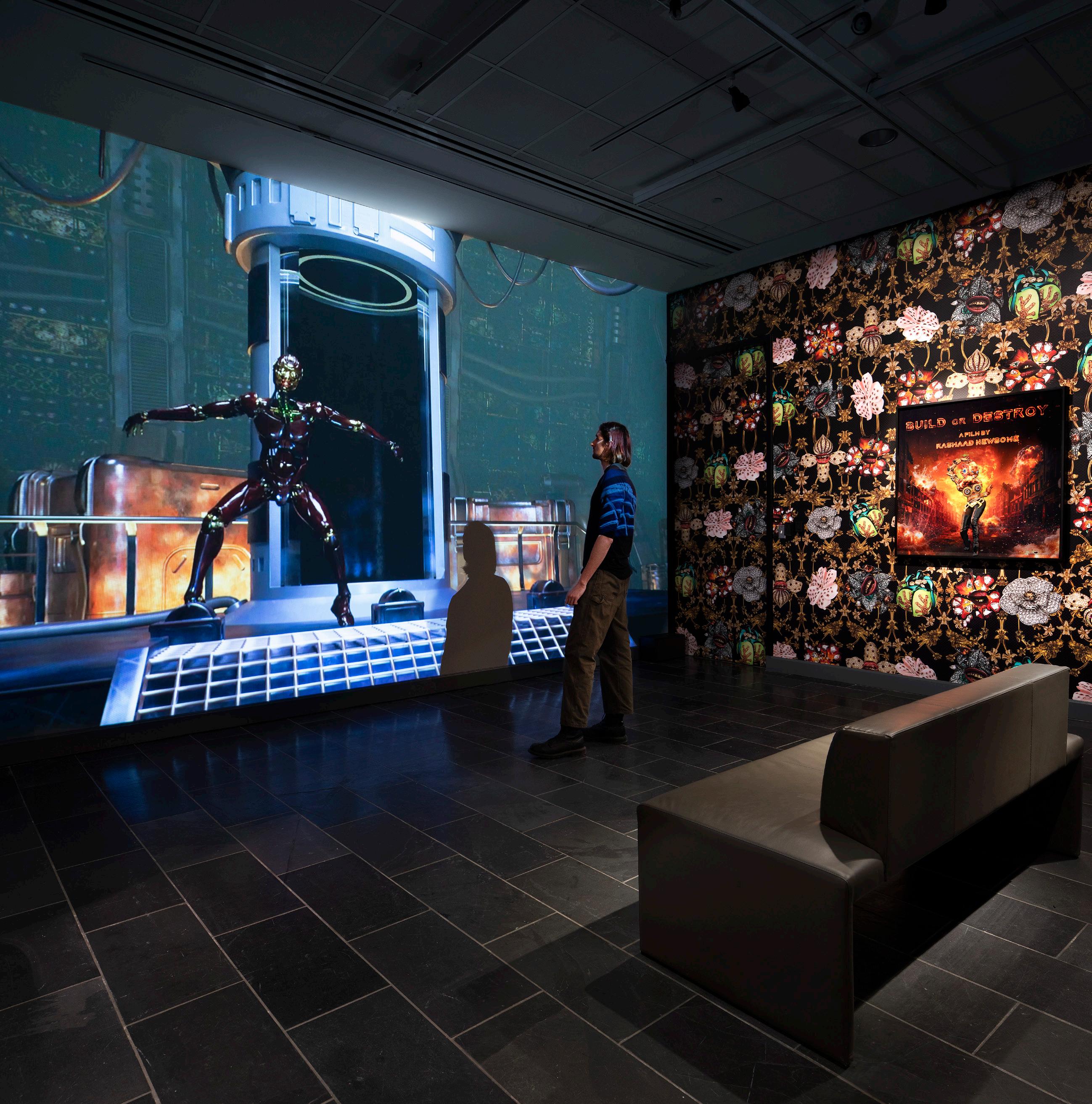
rashaad newsome
Chimera was an immersive exhibition centered on a newly commissioned film, also titled Chimera, which fuses elements from Newsome's prior works Hands Performance and Build or Destroy with a new interquel film that bridges their narratives. This connecting piece explores the origins and journey of the bejeweled figure in flames from Build or Destroy, revealing where they come from and the purpose that led them to Earth. This

exhibition reflected a bold shift in Newsome's practice toward sci-fi filmmaking, layering the architecture of film, movement, and world-building to probe themes of identity, resistance, and creation.
Rashaad Newsome’s work blends several practices, including filmmaking, animation, collage, sculpture, photography, music, writing, artificial intelligence, community organizing, and performance, to explore the intersections of these mediums and challenge traditional narratives and techniques. Drawing from diasporic traditions of improvisation, he incorporates elements from advertising, the internet, art history, and Black and Queer culture to produce counter-hegemonic works that oscillate between social practice and abstraction. Newsome holds a 2023 honorary doctorate in fine arts from the University of Connecticut, a BFA in art history from Tulane University, a certificate of study in digital post production from

Film/Video Arts Inc., and studied MAX/ MSP programming at Harvestworks Digital Media Art Center.
• Penny Stamps Speaker Series: "Engineering Futures: Art, Code, and the Architecture of Liberation" with Rashaad Newsome
• Opening Reception with Rashaad Newsome
• Rashaad Newsome’s 2012 Shade Compositions (SFMOMA) (2012): A Special Screening
• Eight curator-led class visits to the exhibition
Informed by her experience as a refugee, Phung Huynh’s work explores the complexities of displacement, assimilation, and cultural negotiation among Cambodian and Vietnamese refugees who have resettled in the United States. Graphite portraits of family members on pink donut boxes are reminiscent of their ID photos while in Thai refugee camps. The pink boxes are an homage to Southern California donut shops, 90 percent of which are owned by the families of Cambodian refugees. Recent drawings allude to the sacred Khmer Buddha heads looted from Cambodia and still housed in prominent American museums. Banners reveal headless statues left behind in Cambodian temples. Through this
myriad of visual material and references, Huynh suggests a re-assemblance of things, reunion, restitution, and hope renewed for future generations.

Phung Huynh is a Los Angeles-based artist and educator with a practice in drawing, painting, public art, and community engagement. She is assistant professor of art at California State University Los Angeles. She has served as Chair of the Public Art Commission for the city of South Pasadena, Chair of the Prison Arts Collective Advisory Council, and on the Board of Directors for LA Más, a non-profit organization that serves BIPOC working class immigrant communities. Huynh received a BFA with distinction from the Art Center College of Design in Pasadena and an MFA from New York University. She is a recipient of the city of Los Angeles Individual Artist Fellowship and the California Arts Council Individual Established Artist Fellowship, among other awards. She is represented by Luis De Jesus Los Angeles.

• "Love in the Time of War: Resettlement and Sponsorship" with Phung Huynh and her godmother Karen Jorgenson
• Penny Stamps Speaker Series: "Angkorian Homecoming: Resettlement and Returning Home" with Phung Huynh
• Opening reception with Phung Huynh
• Cambodian Classical Dance Workshop with Mea Lath and the Modern Apsara Company
• DJ Night at the Neutral Zone with DJ Hunny and Phung Huynh
• DJ & Donuts Dance Party with DJ Hunny and Phung Huynh
• Eight curator-led class visits to the exhibition


On The World With The World was an exhibition of 40 artworks by artists from the Progressive Art Studio Collective (PASC) program. PASC is the first progressive art studio and exhibition program in Detroit and Wayne County dedicated to supporting artists with developmental disabilities and mental health differences to advance artistic practices and build individual careers in the art and design fields. This exhibition introduced the PASC program—and the wide range of styles and ways of working that drive this community of artists—to the Ann Arbor community. The exhibition was hung salon style, referencing the communal character of the Osterman Common Room as a social gathering space, intending to bring engaged people together for conversation on art, disabilities, and questions of access in the art world.
Sherri Bryant, Santina Dionisi, Julianne Dombrowski, Robert Duncombe, Christopher Evans, Lewis Foster, Tiffany Foster, David Harris, Rodney Hudson, Shawn Jackson, Joseph Lucas II, Richard Marshall, Ryan McDonagh, Nathaniel McNeal Jr, Keisha Miller, Vanessa Montgomery, Alsendoe Owens, John Peterson, Bruce Rice, Dale Roberts, Thomas Saunders, Stephan Tatum, Jeremy Taylor, Promise Vos, and Lauren Williams

• "Coastal Effects: Empowering Artists with Disabilities through Creative Communities": A Panel Discussion with Paige Wery of Tierra del Sol Gallery and Anthony Marcellini of PASC
• Opening Reception with PASC Artists

Institute for the Humanities Curator
Amanda Krugliak first saw Ericka Lopez’s work in 2023, at Tierra Del Sol Gallery in Los Angeles. The gallery represents artists with disabilities and mental health differences, recognizing the importance and value of their work within the mainstream art world. Lopez’s work was innovative, exuberant, tactile, and direct, and Krugliak felt students might really respond to work that seemed especially meaningful at a time when so many were feeling a sense of isolation and disconnection.
Lopez is a textile artist and ceramicist who lost her sight at an early age and is mostly non verbal. Her vibrant punch rugs, intricate mixed media assemblages, and hand coiled pots are done entirely by feel.
Krugliak and Paige Wery, director of Tierra Del Sol, together with the artist and her support team, devised a detailed plan that enabled Lopez and three of her team members to come to U-M, providing Lopez the support she needed and the same experience and benefit as any other IH artist.
Paige Wery remarked, “What began as a moment of curiosity turned into a meaningful collaboration, through persistence and care.”
Krugliak and Gallery Coordinator Ed Diven met with U-M Accessibility
Consultants Phil Deaton and Brandon

Werner, learning about the many strategies available to make the exhibition and the gallery more accessible to more people.
Lopez’s solo exhibition touch encouraged visitors to touch the textile works and hand-coiled pots as a way to connect more deeply with the artist through an immediate hands-on experience.
During the many punch needle workshops, Lopez shared her skillful techniques with dozens of students making their own fiber art. The engagement shifted institutional paradigms as to what constitutes value, what it means to be inclusive in museum practice, and even how we learn.
The Ericka Lopez project led to the popup exhibition On The World With The World in the Osterman Common Room.
In partnership with the Progressive Arts Studio Collective (PASC) Gallery, which represents artists with disabilities and mental health differences in the Detroit area, the pop-up exhibition showcased forty artworks by over twenty four PASC artists. Wery joined us along with PASC founder Anthony Marcellini, for a public conversation about the complex practices of progressive art studios and the vital contributions artists with disabilities make to the contemporary art scene and more broadly to society. Over a dozen PASC artists joined us, along with family members.

“Thank you for your efforts in setting up the PASC exhibit. Our visit to your Gallery was extra special. You were so welcoming and took great care to make it a memorable experience, especially for Promise. Thank you from the bottom of our hearts!”
–A note from a PASC artist and her parents
Curating Scholarship is a three-day workshop that introduces graduate students and faculty to the process of translating research into visual exhibitions, exploring both conceptual and logistical aspects of curation. Led by Institute for the Humanities Curator Amanda Krugliak, the workshop includes guest presentations and the opportunity to meet with the curator for a one-on-one session to discuss the exhibition potential of their own work.
Presenters:
• Maria Eugenia Cotera, Associate Professor of Mexican American & Latino Studies, University of Texas at Austin
• Mark Dion, Conceptual Artist
• Martha S. Jones, Professor of History at Johns Hopkins University
The institute’s museum-quality gallery has gained national attention for its curated shows each year. Gifts in any amount can help to ensure that our gallery continues a tradition of exhibitions that showcase the synergies between the work of humanities scholars and creative artists. Our exhibitions feature emerging as well as established artists, often with an emphasis on social justice issues.
Fully funding the gallery would ensure not only the future of our exhibition program, but also enable the institute to expand its outreach by multiplying sites of curation across campus and in digital environments, and reaching beyond the campus to new audiences. A gift to endow the gallery would provide a naming opportunity.
One of the easiest ways to support the humanities is through an outright gift to the Institute for the Humanities. The University of Michigan makes giving such gifts very easy through its secure gift website (https://giving.umich.edu/um/make-a-gift). Enter fund number 700976 in the search field to support the gallery in perpetuity.
To discuss establishing an endowment or bequest in detail please contact the institute at humin@umich.edu or 734.936.3518.
“Knowledge Relations: A Conference on Historical Epistemologies, Emerging Methodologies, Contemporary Practices”
The Institute for the Humanities cosponsors a wide variety of faculty and graduate student projects in the College of Literature, Science, and the Arts and the broader university—all of which serve to strengthen intellectual and cultural life on campus and beyond. The events we fund through humanities event grants must have a component open to the public, thus supporting our mission to bring the voices of the humanities to public life underscoring the university’s commitment to life-changing education and expanding the boundaries of learning for everyone.



“Gender Euphoria: Book Launch Party”
“Vesuvius Scrolls: From Ancient Manuscripts to Artificial Intelligence”
“U-M Science, Technology, & Society 25th Anniversary Conference”
“Dr. Martin Cortes Workshop: NonWestern Marxisms: Challenges and Opportunities of a Concept”
“Islam and Nature Conference”
Alyxandra Vesey visit Indigenous Studies Lecture Series
Public Events with Courtney Brannon Donoghue
“The Queer Arab Glossary: A Book Talk with Marwan Kabbour”
Contemporary Ukrainian Literature and Culture Events
“Colorism: An exhibition by Rogério M. Pinto”
“LACS Indigenous Traditions of Resistance to Extractivism Series. Lecture and Workshop with Lorena Kab'nal”

“Making ‘MENA’: Histories of the ‘Middle East,’ Race, and the US Census”
“Maura Finkelstein: Academic Freedom in a Time of Genocide"
“Latine Research Week 2025: Raices y Presencia/Growing a Legacy Together”
“Lingering in the Wound: Sadism and Confusion as Aesthetic Practice,” Lecture and Workshop with Dr. Avgi
Saketopoulou
“Post45 Graduate Symposium”
“Media Industries and Their Fans: Mixed Method Approaches to Studying Media Culture”
“Silences Broken: A Symposium in Honor of Michele Mitchell”
“Becoming and Unbecoming Imperial Subjects”
“Transpacific Marxism: Theory, Practice, Solidarity”
“Olimpia Rosenthal: Weeping Trees' Tales: Narratives of Hevea Brasiliensis, the Global Rubber Boom, and the Political Ecology of Empire”
“Peter Beinart in Conversation with Juan Cole”
“Rethinking the New Hollywood: Insights from the Altman Archive”
“From Schism to Union and Back: Eastern Christians and Catholic Expansion in the Age of Confessionalism”
“2025 CLIFF Conference: Science— Literature—Technology: Rupture, Relation, Constellation"
“What is Critical Now? Media Studies Between Crisis and Critique”
“14th Annual International Graduate
Student Workshop in Armenian Studies: The Archive in Theory and Practice in Armenian Studies”


ASMA BABAN ADMINISTRATIVE COORDINATOR SHAUNDA BUNTON ASSISTANT DIRECTOR, PUBLIC PROGRAMMING AND ENGAGEMENT

ED DIVEN GALLERY COORDINATOR

STEPHANIE HARRELL ASSISTANT DIRECTOR, UNDERGRADUATE ENGAGEMENT AND MARKETING

AMANDA KRUGLIAK
ARTS CURATOR AND ASSISTANT DIRECTOR, ARTS PROGRAMMING

ANNIKA SMITS
GRAPHIC DESIGNER

SHERI SYTSEMAGEIGER CHIEF ADMINISTRATOR

JASON YOUNG DIRECTOR, INSTITUTE FOR THE HUMANITIES AND MARY FAIR CROUSHORE PROFESSOR OF THE HUMANITIES
INSTITUTE FOR THE HUMANITIES EXECUTIVE COMMITTEE
Sueann Caulfield; History, Residential College
Kristie Dotson; Philosophy, Afroamerican and African Studies
Gregory Dowd, ex officio; Associate Dean, Humanities; American Culture
Aida Levy-Hussen; English Language and Literature
Youngju Ryu; Asian Languages and Cultures
Catherine Sanok; English Language and Literature, Women’s and Gender Studies
Jessica Walker; American Culture, Afroamerican Studies and African Studies
Jason Young; ex officio; director, Institute for the Humanities; History
THE REGENTS OF THE UNIVERSITY OF MICHIGAN
Jordan B. Acker, Southfield
Michael J. Behm, Grand Blanc
Mark J. Bernstein, Ann Arbor
Paul W. Brown, Ann Arbor
Sarah Hubbard, Lansing
Denise Ilitch, Bingham Farms
Santa Ono, ex officio
Carl J. Meyers, Dearborn
Katherine E. White, Ann Arbor
NONDISCRIMINATION POLICY STATEMENT
The University of Michigan, including the Ann Arbor, Dearborn, Flint campuses as well as Michigan Medicine, as an equal opportunity employer, complies with all applicable federal and state laws regarding nondiscrimination. The University of Michigan is committed to a policy of equal opportunity for all persons and does not discriminate on the basis of race, color, national origin, age, marital status, sex, sexual orientation, gender identity, gender expression, disability, religion, height, weight, or veteran status in employment, educational programs and activities, and admissions.
Inquiries or complaints may be addressed to the Equity, Civil Rights and Title IX Office (ECRT), 2072 Administrative Services Building, Ann Arbor, Michigan 48109-1432, 734-763-0235, TTY 734-647-1388.
202 S. Thayer Street, Suite 1111 Ann Arbor, MI 48104-1608
734.936.3518

Research into the human condition—how we live in the world and how we live with each other—is vital to the cultivation of a just and equitable society. At the Institute for the Humanities, we facilitate work that examines humanities traditions broadly across space and time, deepens synergies among the humanities, the arts, and disciplines across the university, and brings the voices of the humanities to public life.
Each year we provide fellowships for Michigan faculty, graduate students, and visiting scholars who work on scholarly and artistic projects. We also offer a wide array of public and scholarly events, including public lectures, workshops, discussions, and art exhibitions.
Since 1987, when Arthur Miller read from his memoir Timebends at our inauguration, the institute has granted fellowships to over 500 Michigan faculty, Michigan graduate students, and visiting faculty and artists.
The Institute for the Humanities:
• Encourages fellows to talk and debate, informally and formally—all in an effort to reach beyond the assumptions of a given discipline
• Promotes innovative teaching in the humanities, encouraging fellows to add perspectives from other disciplines to the courses they teach
• Brings nationally known scholars, artists, and performers to Michigan to participate in programs, conferences, and fellowships
• Offers programs reaching out to university and public audiences.
• Brings together those who create—artists, musicians, actors, writers—with those who analyze these art forms.
The University of Michigan is located on the territory of the Anishinaabe people. In 1817, the Ojibwe, Odawa, and Bodewadami Nations made the largest single land transfer to the University of Michigan, ceded in the Treaty of Fort Meigs, so that their children could be educated. We acknowledge the history of native displacement that allowed the University of Michigan to be founded. Today we reaffirm contemporary and ancestral Anishinaabek ties to the land and their profound contributions to this institution.
